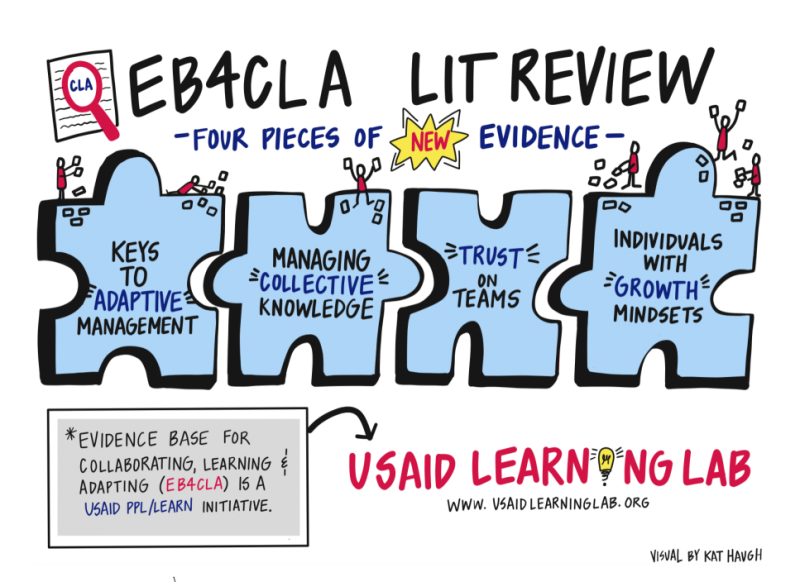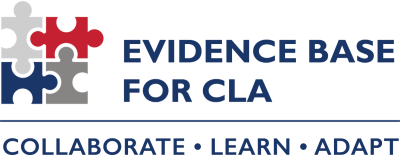New Evidence! What Difference Does Collaborating, Learning, and Adapting Make to Development?

In September 2016, we published the results of a literature review on the evidence base for collaborating, learning and adapting and stated that we planned to update it on an ongoing basis. If you missed it the first time, read this blog post for background information about what the literature review asked and what we found.
We just completed our first update, covering literature published between August 2016-February 2017. We intentionally broadened our scope to include relevant grey literature and academic articles from the business, health, education, and development sectors. In addition to finding evidence that further confirmed the themes we discussed in the initial literature review, we also found new evidence that has far reaching implications for the work we do. To read more about those implications, read this handout.
Highlights include:
- Teams that have high levels of trust and are considered safe for interpersonal risk-taking tend to be better at learning and adapting.
Managing adaptively requires a level of group tolerance for risk-taking, which by extension is contingent on teams having trusting relationships. The literature reviewed found that high trusting teams generally tend to be high-performing. Why are high trusting teams higher performing? Because they also tend to have high levels of “psychological safety,” which is the shared belief that the team is safe for interpersonal risk-taking.1 This means they are more likely to participate in risk-taking learning behavior, and by extension proactive learning-oriented action, which positively impacts results.2
- Quality knowledge management systems have a significant impact on project performance.
People act as nodes of knowledge. As such, human interaction is the basis of knowledge sharing and utilization. The literature reviewed found that knowledge management (KM) processes that are people-centric and facilitate reflection and learning are positively linked with improved outcomes. A study recently conducted by RWTH Aachen University in Germany3 quantitatively tested the proposed relationship between KM and performance. The researchers found that KM has a significant effect on the success of projects. This is a big deal and has implications for overall organizational effectiveness. It means that when teams follow the steps of the knowledge cycle in order, they are more effective at learning from past experience and achieving their goals.
- Individuals who are curious, have “growth mindsets,” and are able to empathize with their colleagues are generally better able to adapt to changing circumstances.
Ultimately, it is individuals who take on the work of collaborating, learning, and adapting within organizations and across partner organizations. Individual personality traits, habits, and competencies can affect who is more likely to take on these behaviors. The literature reviewed found the ability to be flexible and adaptive is highly related to individual personalities, which in turn drive office culture and institutional appetite for change. Across sectors, the literature found that hiring those with “adaptive mindsets” (inquisitive by nature, able to ask the right questions, flexible skillsets) and those that show sensitivity to the feelings and needs of their colleagues had a direct impact on a team’s ability to learn and adapt to affect change.4
- Adaptive management contributes to sustainable development particularly when it has leadership support, public support, and an adequate investment of time.
There is a growing body of evidence suggesting that aid agencies are most successful when they are able to operate flexibly and manage adaptively. In many ways, insights from the business and natural resource management sectors parallel much of the debate in development practice. One study recently found that companies that which apply more data-driven and adaptive leadership practices perform better compared to those which focus less on those practices.5 Another study found that change brought about by adaptive management can be achieved, but it can only be achieved slowly, with an adequate investment of time, and it requires key ingredients of: leadership, data, patience, and public support.6
The full literature review summary is posted here on USAID Learning Lab. Have a look at it, and then tell us what you think in the comments below.
What USAID and LEARN are doing to build the evidence base for CLA
The literature confirms our collective experience that the impact or contribution of CLA on organizational effectiveness and development outcomes is difficult to measure. Strengthening the base of evidence around CLA’s contribution is a key area for further research. To this end, USAID’s Bureau for Policy, Planning and Learning and the LEARN contract are pursuing an “Evidence Base for CLA (EB4CLA)” work stream that includes several complementary lines of inquiry, addressing the questions highlighted above. These include:
- Updates to the literature review: We will update our literature review semi-annually. If you know of articles we should include or may have missed, please contact us at [email protected] with the subject line: Evidence Base for CLA.
- CLA Case Competition Analysis: We will review cases submitted through the CLA Case Competition to analyze how CLA contributes to organizational effectiveness and development results. The first CLA Case Competition analysis will be released this spring and covers entries from the 2015 competition.
- Learning Network for Implementing Partners: USAID/PPL, USAID/E3/localworks, the LEARN contract, and the Knowledge-Driven Agricultural Development contract have convened and are facilitating a Learning Network aimed at developing methods to measure CLA’s contribution to organizational effectiveness and development results. Launched in November, 2016, the learning network includes five grantees whose learning will be synthesized and shared via USAID Learning Lab.
- USAID Internal Learning Network: USAID/PPL and LEARN collaborate with other operating units at USAID, including the Democracy, Human Rights and Governance Center, localworks, Office of Forestry and Biodiversity, and the Global Development Lab to address these key learning questions and leverage the knowledge each operating unit brings to bear, about the contribution CLA makes, what works in changing organizational processes and behavior, and so on.
- Additional studies: These studies, currently under development, will employ a range of methods, including evidence reviews, theories of change analysis, contribution analysis, to compare strong CLA approaches with counterfactuals, negative cases, and/or alternative management approaches and thus address one of CLA’s most difficult measurement challenges.
We are excited to be launching this work and look forward to sharing what we learn as we move forward. We also want to hear from you about evidence you are generating to answer these learning questions and what you would most like to learn about. Again, please contact us at [email protected] with the subject line: Evidence Base for CLA.
We also hope our evidence building work is responsive to the needs and interests of our larger community. Please share your feedback with us by emailing it to [email protected]. Thank you!

[1] See Dr. Amy Edmondson’s research to learn more: Edmondson, Amy. (1999). Psychological Safety and Learning Behavior in Work Teams. Cornell University. Sage Journal.
[2] Hakanen, M., & Soudunsaari, A. (2012). Comments. Technology Innovation Management Review, 2(6). Retrieved from https://timreview.ca/article/567; Costa, A. C. (2003). Work Team Trust and Effectiveness. ResearchGate, 32(No. 5), pp.605–622. doi:10.1108/00483480310488360; Erdem, F., Ozen, J., & Atsan, N. (2003). The relationship between trust and team performance. Work Study, 52(7), 337–340. doi:10.1108/00438020310502633
[3] Bubwolder, Peter, and Basse, Felix. (2016). An Empirical Study of the Effect of Knowledge Management on Ramp-Up Performance in the SME Sector. RWTH Aachen University, Germany.
[4] Byrne, K., Sparkman, T. and Fowler, B. (2016). Getting There from Here: Knowledge, Leadership, Culture and Rules toward Adaptive Management in Market Systems Programmes. London: Beam Exchange; Mercy Corps and International Rescue Committee (IRC). (2016) Adapting Aid: Lessons from Six Case Studies. Edinburgh: Mercy Corps; Dweck, C., Walton, G., & Cohen, G. (2014). Academic Tenacity: Mindsets and Skills that Promote Long-Term Learning. Bill & Melinda Gates Foundation; Derbyshire, H., and Donovan, E. (August 2016). Adaptive programming in practice: shared lessons from the DFID-funded LASER and SAVI programmes. Department for International Development; Duhigg, Charles. (2016). What Google Learned From Its Quest to Build the Perfect Team. New York Times Magazine.
[5] Akhtar, P., Tse, M., Khan, Z. and Rao-Nicholson, R. (2016) Data-driven and adaptive leadership contributing to sustainability of global agri-food supply chains connected with emerging markets. International Journal of Production Economics, 181. pp. 392-401. ISSN 0925-5273 Available from: http://eprints.uwe.ac.uk/27723
[6] Franklin, T., Helinski, R., and Manale, R. (September 2007). Using Adaptive Management to Meet Conservation Goals. The Wildlife Society. Technical Review 07-1.



